Integrative type 1 diabetology
An overview of current studies at the Gerhard Kienle Chair
Rhythmic massage for type 1 diabetes - regulate stress, strengthen body awareness
Project overview
As part of our research project, we are investigating how Rhythmic Massage Therapy (RMT) according to Wegman/Hauschka affects stress regulation and interoception - i.e. the subtle perception of internal body signals - in adults with type 1 diabetes (T1D).
Rhythmic massage was developed in the context of anthroposophic medicine. Unlike many classic forms of massage, which primarily release muscular tension or knead vigorously, it works with gentle, vibrating, rhythmic movements. These not only promote blood circulation and relaxation, but also specifically address the autonomic nervous system - the system responsible for stress reactions, inner balance and the regulation of vital bodily processes.
Chronic psychosocial stress is considered a decisive risk factor that can impair both the course of the disease and the quality of life of people with type 1 diabetes. This is precisely why approaches are needed that not only strengthen blood sugar levels, but also inner balance.
Rhythmic massage offers a gentle, non-pharmacological and easily accessible way to reduce stress, train body awareness and promote inner balance. However, there has been a lack of scientific research into the specific effects of this form of therapy on stress parameters and glycaemic stability. This is precisely where our project comes in.
U-Health: Regulating emotions and stress in type 1 diabetes - a pilot study
Project overview
Type 1 diabetes (T1D) appears to be on the rise in Europe, and with it the burden of a range of outcomes, including health status, productivity, activity and utilisation of health resources (You & Henneberg 2016). The complexity of diabetes itself, blood glucose fluctuations and fear of long-term complications contribute to high diabetes-specific burden (Bollepalli et al. 2012). Around 373,000 adults and 32,000 children with T1D (Fisher et al. 2016) live in Germany, and the rate of new cases of T1D is currently increasing by 3.5% annually (http://T1dtoolkit.org).
According to international reviews, it is evident that despite modern technologies such as insulin pumps and continuous glucose monitoring systems, glycaemic control remains suboptimal for most people with type 1 diabetes (Prigge et al. 2022). The disease management programmes implemented in Germany have made it possible for around 50% of those affected to achieve the agreed HBA1c value. However, people with T1D are still at an increased risk of developing long-term psychological and neurological consequences such as depression and cognitive decline or macrovascular and microvascular comorbidities (Buchberger et al. 2016). 25.5 % of all T1D patients in Germany already suffer from double diabetes (Merger et al. 2016).
The question arises as to what resources people with such a complex disease as T1D can develop and what support they can utilise. Which integrative medical approaches can be helpful for them?
Further information
- Responsible: Gerhard Kienle Chair of Medical Theory, Integrative and Anthroposophic Medicine
- Funding: The study is funded by the Chaja Foundation.
- Project website
Hypotheses
Those affected have repeatedly expanded the previous treatment concepts from their perspective (insulin dose adjustment, sport, fasting, closed loop). They have now discovered that limited emotional regulation skills can hinder appropriate diabetes management. This can involve a wide range of individual aspects - from a lack of ability to regulate stress to auto-aggressive behavioural patterns, depression or traumatic stress. It may be helpful to understand your own processes and learn appropriate regulation skills. Well-evaluated programmes to promote emotional competence, such as the Zurich Resource Model and training in the field of Somatic Experiencing and others, help with this. We now want to investigate this to see if they can be integrated into the care of people with T1D in the long term.
Intervention
The newly developed annual course is intended as a joint exploration of ways to not only regulate blood sugar, but also to develop self-help techniques for regulating emotional and stress levels. We will use modern findings and tools from psycho-neuro-immunology, current stress research, the Zurich Resource Model, Somatic Experiencing according to Peter Levine and introspection research. All steps are accompanied and deepened by mindfulness exercises and pressure-free perception and movement games in the context of music and movement.
Question
Is the programme of interest to those affected? Are enough of those affected taking part in the programme? How do they perceive the modules? Can emotional regulation be learnt by people with T1D and integrated into everyday life? Could this competence help to increase well-being and reduce the risk factors for an additional T2D as well as for depression and other secondary diseases?
Ethics: A positive vote was given by the ethics committee of Witten/Herdecke University.
Fasting for type 1 diabetes
Fasting, defined as the voluntary abstinence from solid food over a certain period of time, has been practised in numerous religions for thousands of years and is known in modern naturopathy as an important intervention that can have a beneficial effect on various ailments.
Buchinger fasting is a guideline-based multimodal intervention and includes exercise, resource-orientated training and mindfulness in addition to a diet based solely on liquids (broth, water, tea).
Fasting interventions were previously prohibited for people with type 1 diabetes. We have investigated the feasibility, the positive effects as well as fasting-related side effects: Fasting for people with T1DM is possible - taking into account the given risk factors.
We were also able to realise various sub-studies. We were able to examine the effects of fasting on the acid-base balance of the study participants. We also investigated the effects of fasting on cognition in a pilot study.
The award of the Hufeland Society 's Holzschuh Prize in 2021 emphasises the importance of this work and the need to continue it.
Further studies are in preparation, please feel free to contact us!
The cinnamon apple - first food after 7 days without solid food (Photo: Marion Christ)
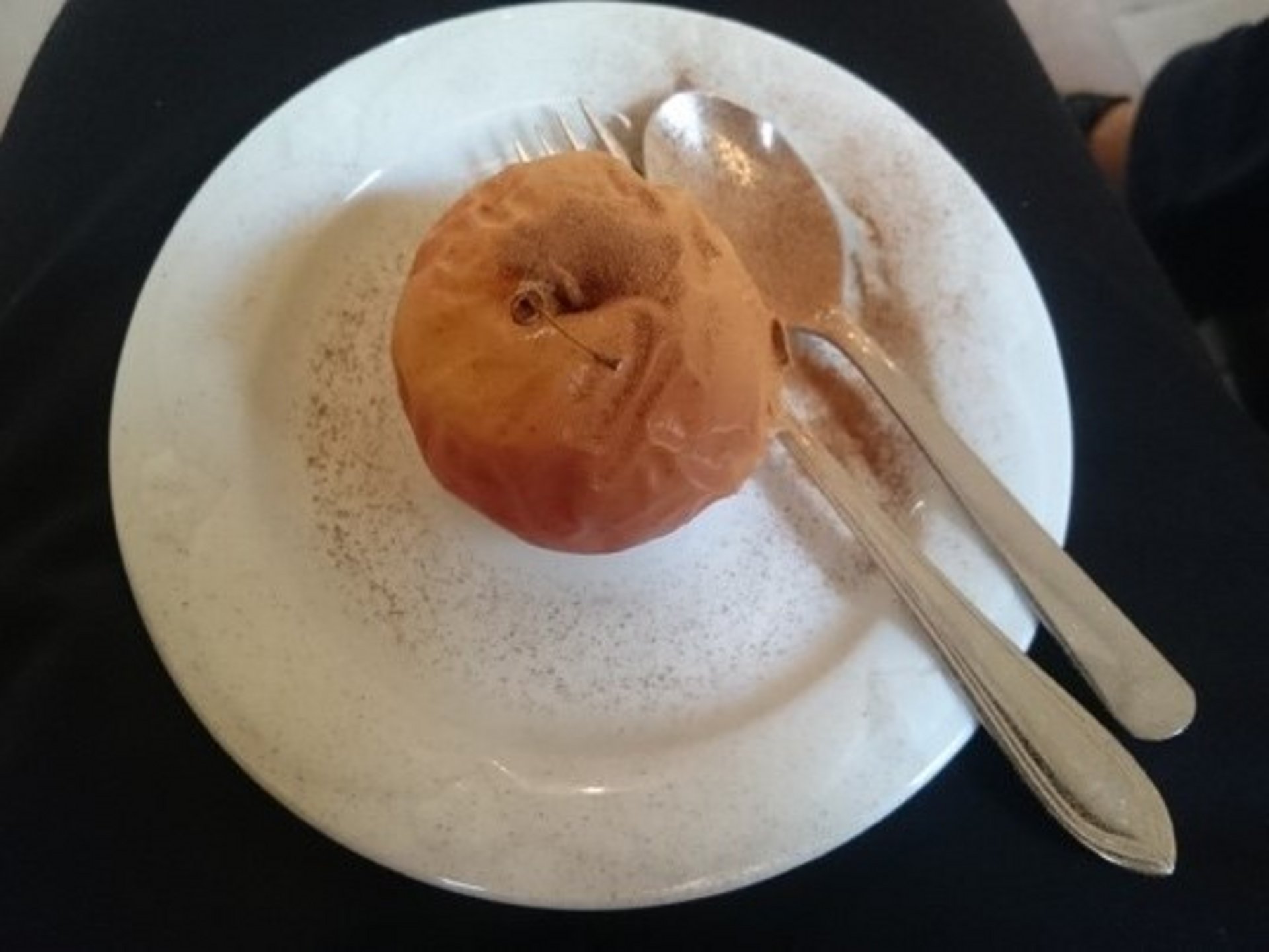
The solemn ceremony of breaking the fast after 7 days (Photo: Marion Christ)
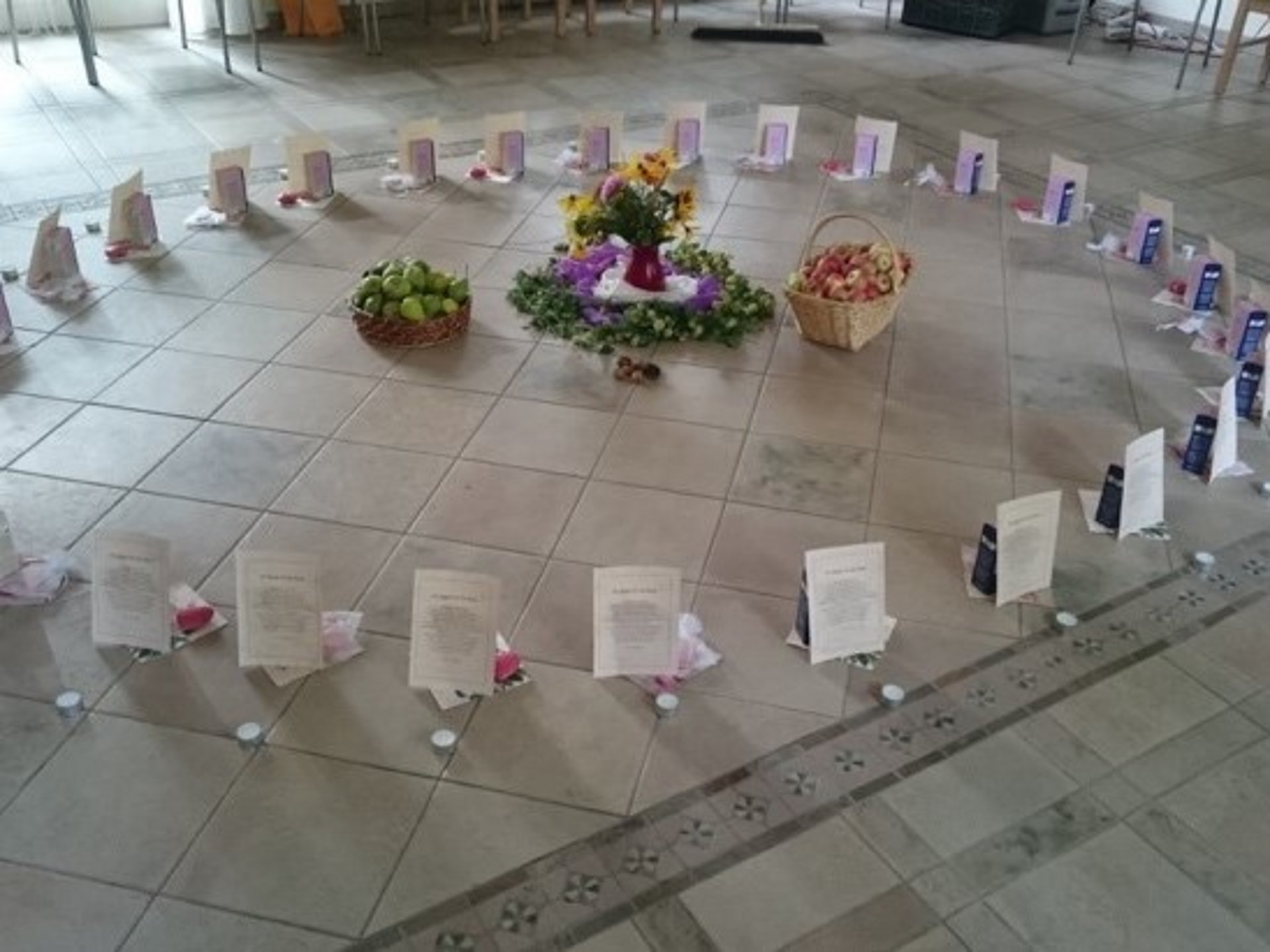
The tiresome finger prick - bloody glucose and ketone measurements were necessary for the study (Photo: Marion Christ)
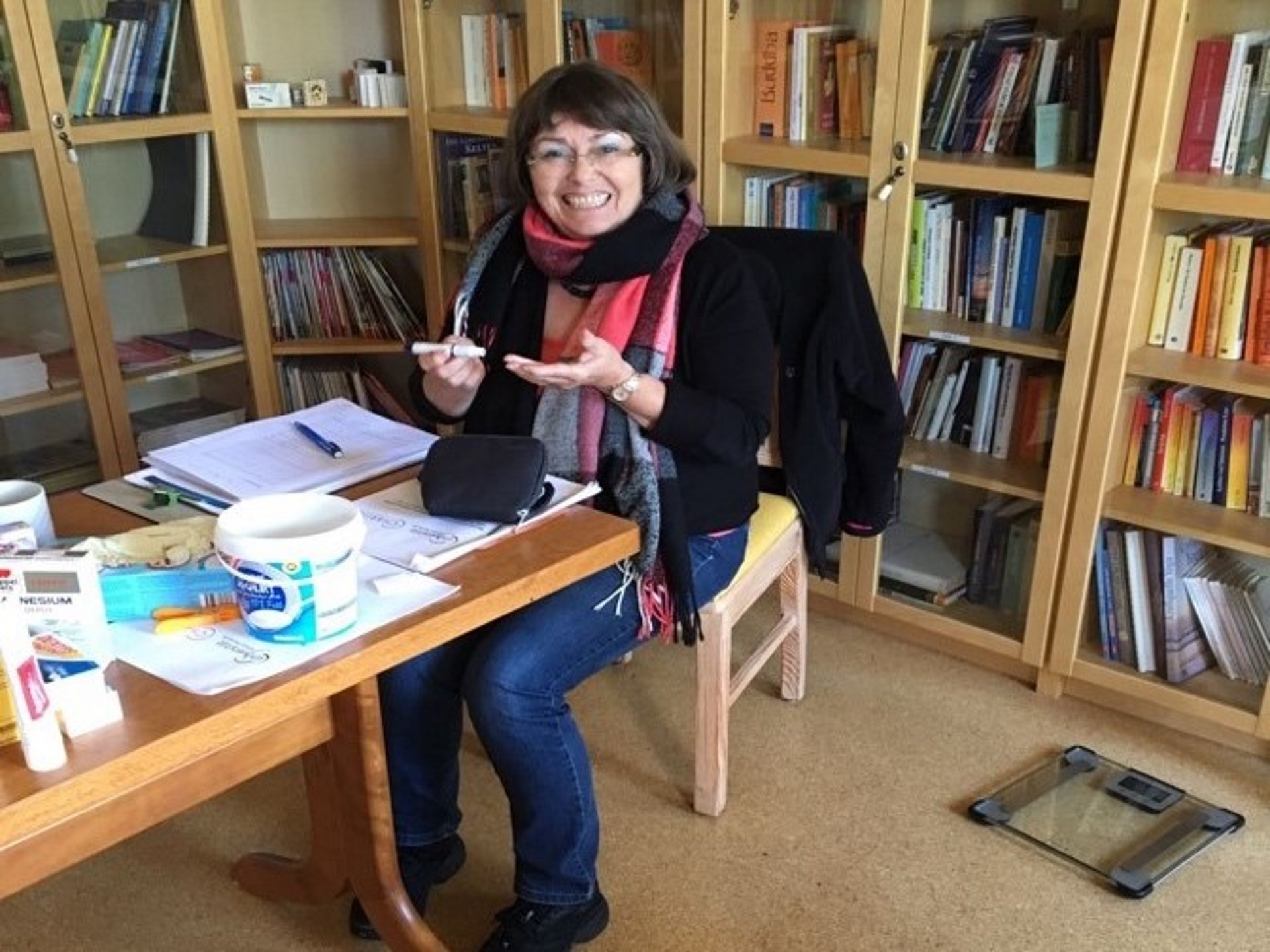
For measuring the acid-base balance: collection and filling of the 24-hour urine (Photo: Marion Christ)
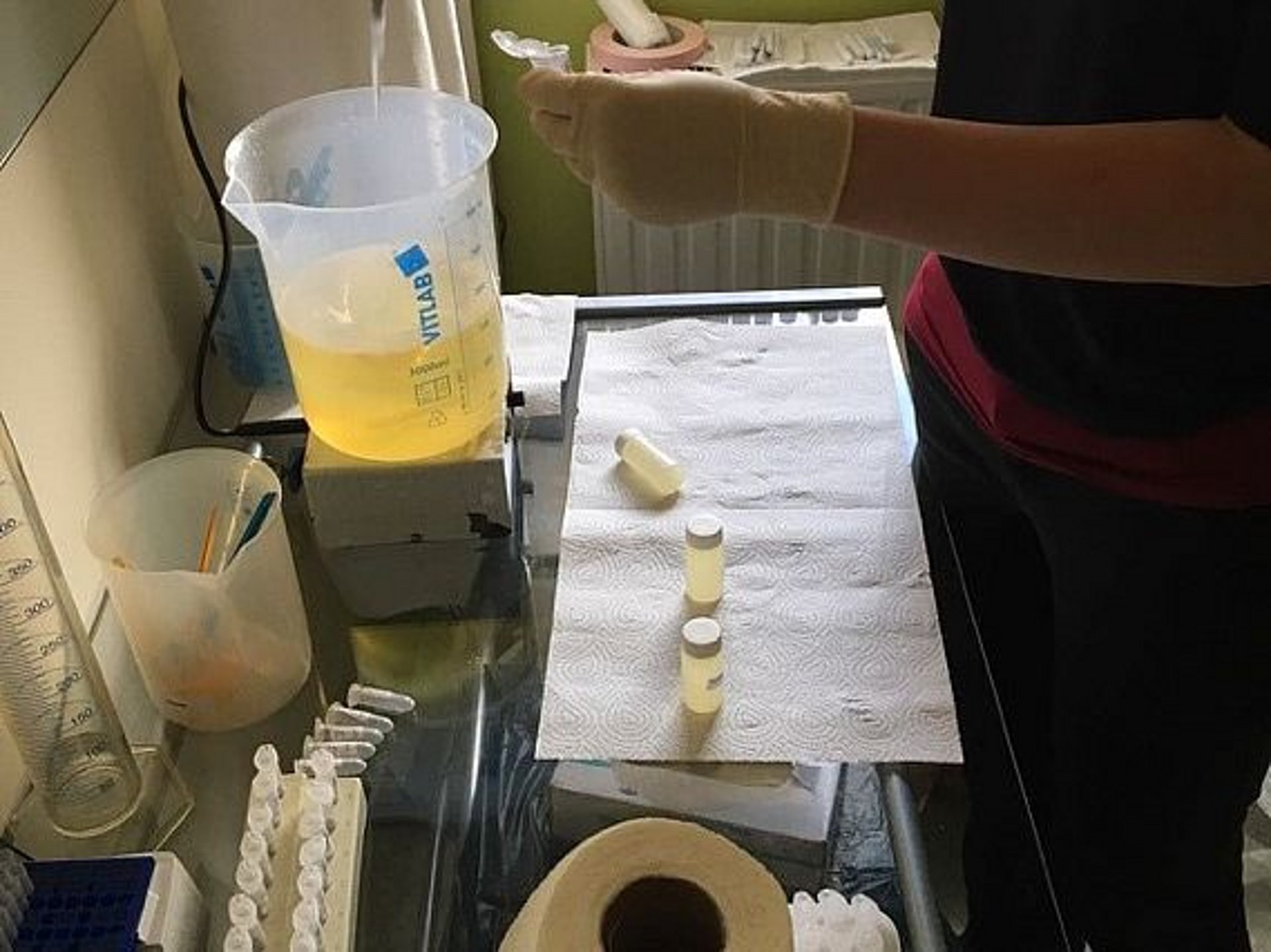
Publications on fasting for T1 DM
- Graef FA, Berger B, Bahr LS, Stange R, Michalsen A, Paul F, Vallance BA and Jacobson K (2025) Fasting elicits gut microbiome signature changes that extend to type 1 diabetes patients. Front. Endocrinol. 16:1623800. doi: 10.3389/fendo.2025.1623800
- Berger B, Egert V, Martin D, Jenetzky E: Inpatient Fasting Options for People with T1d in German-Speaking Countries. J Hum Nutr Food Sci 2023, 11(1166).
- Berger B, Jenetzky E, Köblös D, Stange R, Baumann A, Simstich J, Michalsen A, Schmelzer KM, Martin DD. Seven-day fasting as a multimodal complex intervention for adults with type 1 diabetes: Feasibility, benefit and safety in a controlled pilot study. Nutrition. 2021 Jun;86:111169.
- Berger B, Martin D, Jenetzky E, Schmelzer K: Fasting intervention for people with type 1 diabetes (T1D) as patient-initiated research. European Journal of Integrative Medicine 2021, 48:101907.
- Berger B, Jenetzky E, Köblös D, Stange R, Baumann A, Simstich J, Michalsen A, Schmelzer KM, Martin DD. Seven-day fasting as a multimodal complex intervention for adults with type 1 diabetes: Feasibility, benefit and safety in a controlled pilot study. Nutrition. 2021 Jan 22;86:111169.
- Bettina Berger, Rainer Stange, Andrea Baumann, Diana Köblös, Daniela Liebscher, Martina Bley, David Martin: Fasting for people with type 1 diabetes (FaMeD1): Pilot study with regard to feasibility and diabetes-related quality of life - a study protocol. Nutrition and Medicine. 2019;6(34(02):74-81).
- Berger B, Stange R, Liebscher D, Michalsen A, Büssing A, Schmelzer K, ....Martin D: Fasting intervention according to Buchinger for people with type 1 diabetes mellitus (T1DM) with regard to safety and feasibility. Diabetology and Metabolism. 2019;14(S 01):EP 46.
- Berger B, Stange R, Michalsen A, Martin DD. Prolonged Fasting in T1DM – case study from patient perspective. European conference of Integrativ medicine 5.-8.Mai; Berlin 2017.
Co-operation partners of the fasting study
Chief Physician at Immanuel Hospital Berlin, holder of the endowed professorship for clinical naturopathy at the Institute for Social Medicine, Epidemiology and Health Care Economics at Charité Universitätsmedizin Berlin
Head of the DONALD Study branch of the Institute of Nutrition and Food Sciences (IEL) at the University of Bonn with research specialisations in the following areas Adrenal gland, adrenarche, steroid hormones and nutrition, acid-base metabolism, nutrition-relevant biomarkers
Children and adolescents with type 1 diabetes
Around 32,000 children in Germany live with a diagnosis of type 1 diabetes. The trend is rising - especially during the coronavirus pandemic, the proportion of children with newly diagnosed T1DM, diabetic ketoacidosis at initial diagnosis and poor blood glucose control after diagnosis has increased. Children need to learn to consider the impact on blood glucose in everything they do, whether they are running around, playing or eating. Thanks to app and sensor-based continuous glucose monitoring, it is now possible for parents to take on this job. Nevertheless, the aim is for children to develop a comprehensive quality of life in addition to blood glucose regulation. To be able to test this, we have developed and validated our own self-efficacy scale for children and adolescents. We were able to map a holistic training programme for children and adolescents with type 1 diabetes, which includes the promotion of emotional and social skills.
Children and adolescents with type 1 diabetes have to give themselves insulin for the rest of their lives - with a syringe or an insulin pump (Photo: Dörte Hilgard)
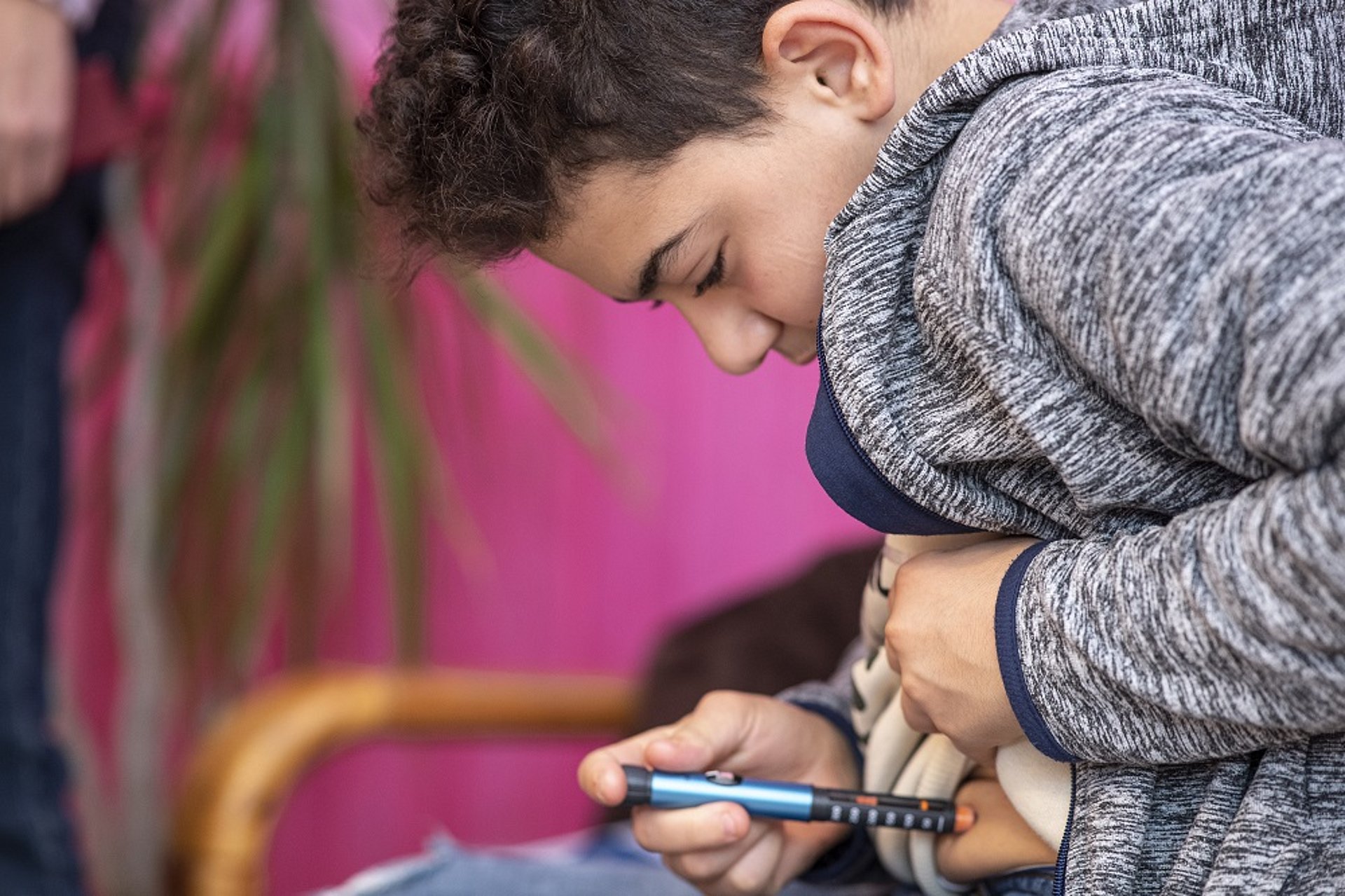
Publications on T1 DM in children and adolescents
- Zamani Meymian E, Marmulla L, Kettnaker F, Vollhase J, Berger B, Martin D, Jenetzky E: Essstörungen bei Kindern und Jugendlichen mit Typ-1-Diabetes mit und ohne Einwanderungsgeschichte. Diabetologie und Stoffwechsel 2025; 20: 293–299,
https://doi.org/10.1055/a-2619-4859. - Kettnaker F, Marmulla L, Zamani E, Vollhase J, de Sousa G, Jenetzky E, Berger B, Hilgard D, Martin D: Beeinflusst musikalische Erziehung die Lebens-und Versorgungsqualität von Kindern und Jugendlichen mit Diabetes mellitus Typ 1? Zeitschrift für Komplementärmedizin 2024, 16(02):53-57.
- Marmulla L, Zamani E, Kettnaker F, Vollhase J, Jenetzky E, Berger B, Martin D, de Sousa G: Gesundheitsbezogene Lebensqualität bei Kindern und Jugendlichen mit Diabetes mellitus Typ 1 als (direkte) Nachkommen von Einwanderern. In., vol. 16: Georg Thieme Verlag KG; 2021.
- Sethe D, Büssing A, Hilgard D, Berger B. Validation of the German version of the Pediatric Self-Efficacy for Diabetes-Type-1 Scale. PPmP-Psychotherapy Psychosomatics Medical Psychology. 2020;70(8):349-57.
- Dominik Sethe, Dörte Hilgard, Arndt Büssing, Bettina Berger: Validation of the German version of the Pediatric Self Efficacy for Diabetes Type 1 Scale, Psychotherapie, Psychosomatik, medizinische Psychologie, Thieme Verlag Stuttgart, February 2019.
- Bettina Berger, Dominik Sethe, Dörte Hilgard, David Martin, Peter Heusser: Design of a Self-Management Programme for Children Aged 6-12 Years with Type 1 Diabetes Mellitus at the Community Hospital Herdecke, Germany. Complementary Medicine Research 08/2017; 24(4), DOI:10.1159/000479532.
- Sethe D, Hilgard D, Ostermann O, Berger B, Witten / Herdecke: PP-06 Retrospective cost- effectiveness analysis of an integrative diabetes education programme for children and adolescents with type 1 diabetes. Japed 2018, Weimar; 11/2018, DOI:10.1007/s00112.
- Sethe D, Hilgard D, Büssing A, Berger B: Special characteristics of the participants in integrated training for children with type 1 diabetes mellitus (T1DM) aged between 12 and 17 years compared to traditional training. Abstracts for the 43rd Annual Meeting of the International Society for Pediatric and Adolescent Diabetes (ISPAD), Innsbruck; 10/2017.
- Dominik Sethe, Dörte Hilgard, Arndt Büssing, Bettina Berger: Validation of the German version of the Pediatric Self Efficacy for Diabetes-type-1 Scale (PSEDT-1). Joint annual conference of the German Society for Paediatric Endocrinology and Diabetology (DGKED) and the Association of Paediatric Diabetologists (AGPD), Osnabrück; 11/2016, DOI:10.1007/s00112-016-0166-z.
- Sethe D, Büssing A, Berger B. llustration of innovative, integrated diabetes training curricula for children and adolescents with type 1 diabetes mellitus (T1DM). 43rd Annual Meeting of the International Society for Pediatric and Adolescent Diabetes (ISPAD); 2017 10/2017; Innsbruck.
- Berger B, Sethe D, Hilgard D, Heusser P. Is an anthroposophic curriculum for children with Type 1 Diabetes mellitus (T1DM) different from usual care? World Congress of Integrative Medicine and Health; 2017 05/2017; Berlin: BMC Complementary and Alternative Medicine.
Introspection and First Person Perspective
Despite the continuous improvement of technical possibilities in diabetes management, the risks of secondary diseases and the costs of diabetes in old age are high. We design research from the perspective of those affected in collaboration with numerous established research groups and other people affected by type 1 diabetes. We share and discuss our research findings at the Institute for First-Person Research at Witten/Herdecke University. We are working on the links between stress and diabetes self-management and are developing a programme on emotional regulation competence (U-Health-Long version). We are exploring the significance of subjective theories of illness. We are investigating what support traditional or integrative treatment concepts can offer.
Contributions at conferences
- Conference First-Person Science of Consciousness - Theorems Methods Applications: Poster presentation: How to use first person perspective to transform suffering from autoimmune diseases, May 2019 Witten.
- Symposium at the autumn conference of the German Diabetes Society, November 2022: Research from the perspective of those affected
Publications on First Person Perspective
- Berger B, Scheffer C, Jenetzky E, Martin D: Emotional Regulation Competencies for People With Type 1 Diabetes Mellitus (T1D) – A Multimodal Training Program (Current State). THE MIND Bulletin on Mind-Body Medicine Research 2024,
- Berger B, Girke M: Diabetes integrative behandeln: Athrosana, 2024, Heft 247, www.hugendubel.info/fachbuecher/kunst/kunst-allgemein/detail/ISBN-9783905364477/Berger-Bettina/Diabetes---integrativ-behandeln
- Stapelfeldt E, Berger B, Raak CK, Gupta S. Ayurveda for a Type 1 Diabetes Patient with Peripheral Arterial Occlusive Disease: A Case Report. Complement Med Res. 2024;31(1):94-102.
- Berger B: Berger B: Krankheit als Konstruktion - Diabetes mellitus im Vergleich von Schulmedizin und Homöopathie. 01/2003; KVC- Verlag.
- Berger B: "Can a person with diabetes mellitus really be their own doctor?", lecture at the conference of the German Diabetes Society Berlin, 2013.
- Berger B, Michaelis R, Matthiessen PF, Martin D. Transforming stress-induced traumatic reaction patterns in persons with Type 1 Diabetes through introspection. An example of patient led research. Research in Steiner Education. 2019;Vol 10.
- Berger B: Possibilities and threats to the development of individuality in the context of medical care using the example of insulin-dependent diabetes mellitus, type 1. Human individuality - lost and newly sought, Wittener Kolloquium Humanismus, Medizin und Philosophie 978-3- 8260-5508-9 ed. Johannes Weinzirl, Peter Heusser, 07/2015: 139-158; Königshausen und Neumann, Würzburg.
- Berger B: Expertocracy or democracy? The importance of patient participation for the development of scientific facts in medicine using the example of evidence-based diabetology. From scientific fact to knowledge production - Ludwik Fleck and his significance for science and practice, 01/2007: pages 191-211; Peter Lang.
- Berger B: "Ekspertokratsja czy democracja? Udzial pajenta w tworzeniu faktow naukowych w medicinie na prezykladzie diabteologii opartej na faktach." In: Cholui, B, Joerden JC (eds.): Od Faktu naukowego do Produkcji Wiedzy. Ludwik Fleck i jego znaczenie dla nauki i praktyki badawcuej. Warszawa 2013. Translation of the original article in: From scientific fact to scientific production. Ludwik Fleck and his significance for science and practice, Peter Lang Verlag des Wissenschaften, 2007.
- Berger B, Mühlhauser I, Heesen C, Walach H, Bischof M, Scheibler F, Groth S, Vielhaber B, Koppe A, Drees S, Howorka K, Paul A, Loesch W, Schmacke N: Berger B (ed.): Raum für Eigensinn - Ergebnis eines Expertentreffens zur Patientenkompetenz. CAM Expertise edited by Berger B, 01/2011; KVC-Verlag Essen, ISBN: 978-3-86864-006-9, DOI:10.13140/2.1.4506.7041
Contact us
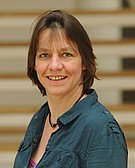
Dr phil.
Bettina Berger
Researcher
Faculty of Health (School of Medicine) | Chair of Medical Theory, Integrative and Anthroposophic Medicine
- 02330-807190
Orcid ID: 0000-0003-4999-8898
Gerhard-Kienle-Weg 4
58313 HerdeckeRoom number: Haus D, DG